Israeli Envoy Uses Iranian Protester's Sign to Denounce Raisi At UN
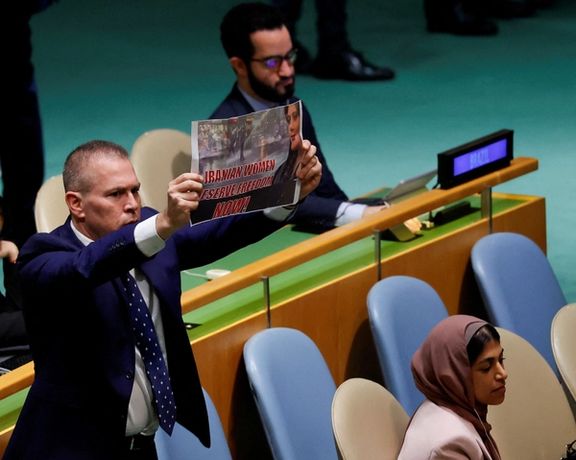
Israel's UN ambassador photographed the poster of an Iranian demonstrator outside the UN in New York and held it up during the speech of Iran's president Ebrahim Raisi.

Israel's UN ambassador photographed the poster of an Iranian demonstrator outside the UN in New York and held it up during the speech of Iran's president Ebrahim Raisi.
The photograph used by Israel’s UN envoy, Gilad Erdan, on Tuesday to protest the “Butcher of Tehran” Raisi in the United Nations General Assembly electrified social media and swathes of the Iranian diaspora.
Hamid Charkhkar, a professor of biomedical engineering at Case Western University, told Iran International that "My wife, Fatemeh, and I came from Ohio to New York to join other Iranian-Americans protesting against Raisi and his delegation. It felt unjust that he, a man responsible for deaths thousands of innocent Iranians, was given a US visa for the UN General Assembly. I had a sign with Mahsa Amini's picture on it, saying 'Iranian women deserve freedom now.' To our surprise, Israel's UN Ambassador, Gilad Erdan, walked up to our protest, clearly showing support for our cause."
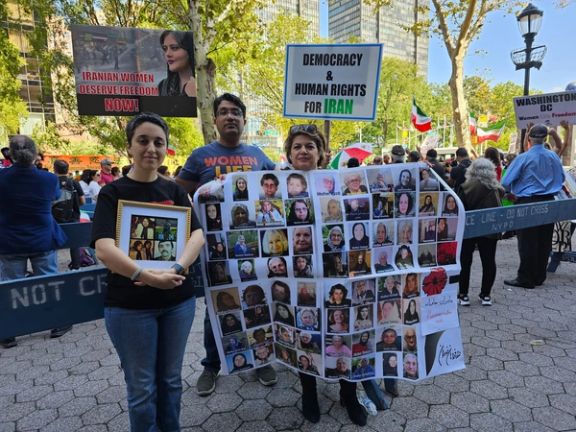
Charkhkar added “He was drawn to my sign and asked if he could take a photo of it. Later, we saw on Twitter that he held my sign during Raisi's UN speech. I want to thank Ambassador Erdan. He helped raise the voices of Mahsa and many young Iranian youth who suffered under the Islamic regime in Iran.
Charkhkar is a member of the Alliance Against Islamic Regime of Iran Apologists (AAIRIA) that seeks to the dismissal of the Iranian regime’s former UN ambassador, Mohammad Jafar Mahallati, from his academic post at Oberlin College in Ohio. Amnesty International has repeatedly accused Mahallati of covering up crimes against humanity with respect to the 1988 massacre.
Iran International reported that Erdan was the only diplomat to walk out during Raisi’s speech. The US government sanctioned Raisi for his role in the massacres of Iranians in 1988 and 2019.

The UN human rights commissioner's office has strongly criticized a newly enacted hijab law in Iran that has increased punishment for women who refuse to cover their heads.
The law imposes harsher penalties, including longer prison sentences and higher fines, on women who do not adhere to the country's strict Islamic dress code for head coverings and modest attire.
During a press briefing held in Geneva on Friday, Ravina Shamdasani, the spokesperson for the United Nations High Commissioner for Human Rights, condemned the legislation. She described it as both “oppressive and degrading.”
“We deeply regret the Iranian parliament’s passing of the new Chastity and Hijab Bill which vastly increases jail terms and provides for crushing fines on women and girls who do not obey the compulsory dress code. In that context, the Bill also targets vague notions of promotion of nudity or indecency.”
Shamdasani explained that under the new regulations, women and girls who fail to comply with the stringent dress code could now face up to 10 years in prison, a significant increase from the previous two-month term. Moreover, fines have been raised from approximately $12 to around $8,500.
The new law follows widespread protests after the tragic death of Mahsa Amini, a 22-year-old woman who died while in custody of the morality police in September 2022, just three days after her arrest, for allegedly not adhering to the Islamic dress code for head coverings.
“Our Office urges the Iranian authorities to take steps to eliminate this and all other forms of gender-based discrimination…We also call on the authorities to abolish all regulations and procedures whereby specifically women’s behavior in public is monitored,” added her statement.
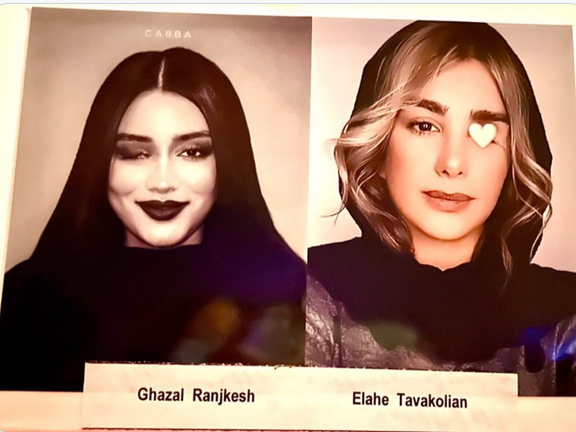
A human rights organization has revealed the identities of scores of individuals who sustained eye injuries when Iranian security forces fired shotguns at protesters.
Iran Human Rights Organization (IHR) emphasized in its Friday report that regime's security forces and plainclothes agents fired at the eyes of protesters, especially women, in a "systematic and deliberate" manner, with a very high degree of precision.
The IHR researchers confirmed 138 cases of eye injuries, with 43 individuals choosing to provide evidence of their injuries anonymously. The remaining 95 cases, including 8 children under 18, are documented in the report.
To put this in perspective, children account for 5% of eye injuries.
The data by the Norway-based organization shows that women comprised a significant 28% of those with eye injuries.
Last February, the IHR also disclosed the identities of 22 individuals who had lost vision in one or both eyes due to the systematic shooting by government agents.
The human rights group, through the publication of a new report, confirmed its previous assessment, stating that the shooting by regime forces at the eyes of protesters began from the very first days of the protests in September last year and continued extensively in various cities across Iran until November 21.
The majority of eye injuries resulted from pellets (metal and plastic), causing vision loss in one or both eyes. Other projectiles like paintball guns and teargas cartridges were also used.
More than 500 civilians were killed by security forces and thousands injured during the anti-regime demonstrations last year and early in 2023.
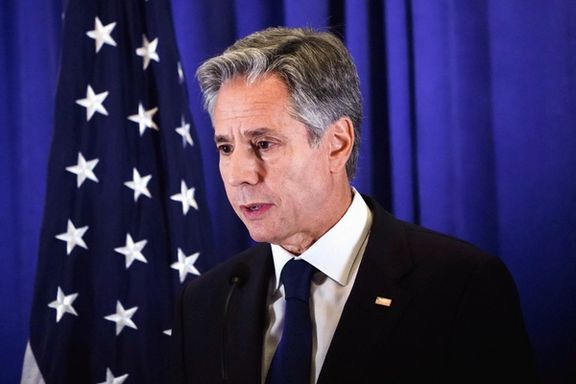
US Secretary of State Antony Blinken has refrained from criticizing the Saudi Crown Prince for suggesting his country will get nuclear weapons if Iran does so first.
Crown Prince Mohammed bin Salam speaking to Fox News this week referred to the danger of Iran producing nuclear weapons and said, "If they get one, we have to get one, for security reasons and the balance of power in the Middle East. But we don't want to see that.”
Asked during the press conference if this kind of Saudi desire is not destabilizing, Blinken replied, “I think the comments that you alluded to point to the fact that Iran’s own activities in pursuing a nuclear program are a profoundly destabilizing element and one that risks the security of countries not only in the region but well beyond it…” He went on to say, “And so the problem is very clear, and the problem is Iran. That is the destabilizing element.”
However, the Biden administration announced a prisoner exchange deal with Tehran in August that also released $6 billion of blocked funds from South Korea. Earlier, Blinken had also waived US sanctions to allow Iraq to release $2.7 billion. Indications point to ongoing secret talks with Qatar’s mediation to release more funds in return for a partial Iranian slowdown of its uranium enrichment. Critics argue that the release of billion of dollars simply empowers the Islamic Republic without imposing real limitations on its nuclear program or destabilizing activities in the region.
Blinken also said that Iran's decision to bar some UN nuclear inspectors suggests it is not interested in being a responsible actor on its atomic program.
The comments suggested Washington is skeptical of Tehran's desire to engage seriously on restricting its nuclear program.
The head of the International Atomic Energy (IAEA) nuclear watchdog has condemned Iran's move to bar multiple inspectors assigned to the country, hindering its oversight of Tehran's atomic activities.
Iran said it was responding to a call led by the United States and three European allies for Tehran to cooperate immediately with the UN nuclear watchdog on issues including explaining uranium traces found at undeclared sites.
One of the agency's key purposes is to prevent the spread of nuclear weapons by verifying that states honor their obligations to use nuclear technology only for peaceful purposes.
The IAEA was responsible for verifying Iran's compliance with the defunct 2015 Iran nuclear deal, JCPOA, under which Tehran curbed its nuclear program in return for the easing of US, European Union and UN sanctions.
Efforts to revive that deal, which then-US President Donald Trump abandoned in 2018, collapsed about a year ago and Washington has been searching for a new way to get Tehran to restrain its program.
"We tried to work indirectly with Iran as well as with European partners and even Russia and China to see if we can get a return to compliance with the Iran nuclear deal ... But Iran couldn't or wouldn't do that," Blinken told reporters.
"Just this past week we saw them remove IAEA inspectors who are critical to doing the work at the IAEA to - as best you can - ensure that Iran is consistent with whatever obligations it has," he said. "That is not evidence of an Iran that is interested in actually being a responsible actor."
Tehran's move, known as "de-designation" of inspectors, is allowed; states can generally veto inspectors assigned to visit their nuclear facilities under the nuclear Non-Proliferation Treaty and each country's safeguards agreement with the agency.
With reporting by Reuters
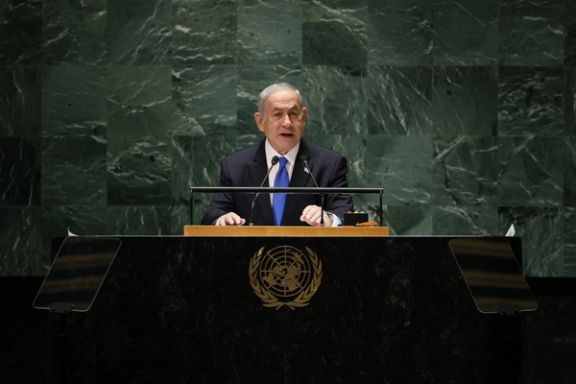
Israeli Prime Minister Benjamin Netanyahu has talked of a new Middle East with the friendship between Israel and Arab nations without Iran’s “terror tentacles.”
During his speech at the UN General Assembly on Friday, he stated that his country stood at the threshold of peace with Saudi Arabia, envisioning that this peace could be achieved with the assistance of US President Joe Biden and reshape the Middle East.
In contrast to Iran's President Ebrahim Raisi, whose 30-minute speech consisted of a series of rants justifying Iran's adversarial stance towards the West, the Prime Minister of Iran's archenemy presented a solution to address regional issues and reshape the Middle East. He asserted that a peace agreement with Saudi Arabia could be transformative for the Middle East, provided that the nuclear threat posed by Iran was eliminated.
He displayed contrasting maps showing Israel’s isolation at the time of its creation in 1948 and the six countries that have normalized relations with it, including four that did so in 2020 in the so-called Abraham Accords. “There’s no question the Abraham Accords heralded the dawn of a new age of peace.
He stated, "Such a peace will go a long way in ending the Arab-Israeli conflict and will encourage other Arab states to normalize their relations with Israel." He emphasized that it would also "promote broader reconciliation between Judaism and Islam, between Jerusalem and Mecca, and between the descendants of Isaac and the descendants of Ishmael."
Raisi had earlier in the day stated in Tehran that the solution to the Palestinian issue does not lie in normalization agreements or agreements like the Camp David Accords, Oslo Accords, or Sharm El Sheikh Memorandum, but rather with the Supreme Leader.
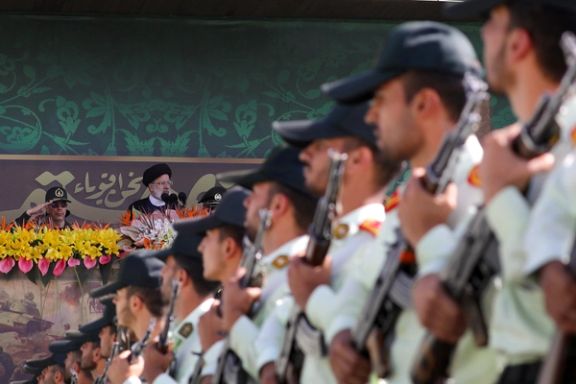
Netanyahu referred to Iran as a "fly in the ointment" in terms of regional peace and criticized the world for appeasing the regime's oppression at home and support for conflicts worldwide.
He called on the international community to do more to support "the brave women and men of Iran who despise this regime and yearn for freedom, who have bravely taken to the streets of Tehran and other Iranian cities and faced death."
He pointed out that the international community had been threatening "crippling" sanctions but turning a blind eye to Iran's uranium enrichment, alluding to the largely defunct 2015 Iran deal.
"Eight years ago, Western powers promised that if Iran violated the nuclear deal, sanctions would be reimposed," Netanyahu stated. "Well, Iran is violating the deal. But the sanctions have not been reimposed." He emphasized that this policy needed to change to halt Iran's nuclear ambitions.
Netanyahu also discussed the role of Artificial Intelligence (AI) advancements in reshaping the Middle East. While Iran's delegation engaged in a cat-and-mouse game to evade journalists during their stay in New York, with one of Iran International's reporters being attacked by a member of Raisi's entourage, Netanyahu was meeting individuals who could potentially turn his promises into reality.
He shared the stage with Tesla CEO Elon Musk at the auto manufacturer's Fremont factory, addressing a potentially contentious event before millions. He spoke about the risks and opportunities presented by artificial intelligence, as well as topics like antisemitism and judicial reform, all while appearing calm and well-prepared.
Netanyahu's message was particularly tailored to the two leaders he is attempting to engage in a legacy-defining agreement: Joe Biden and Saudi Arabia's Crown Prince Mohammed bin Salman.
Additionally, Netanyahu had a first ever face-to-face meeting with Turkish President Tayyip Erdogan on Tuesday, marking a milestone as the two countries have been gradually improving their relations, strained by disagreements over policies towards the Palestinians. Netanyahu suggested that if a solution could be found, Israel would cooperate, while Raisi had earlier asserted that "resistance against Israel" is the key to resolving the Palestinian crisis. Netanyahu and Erdogan also agreed to visit each other's countries in the near future
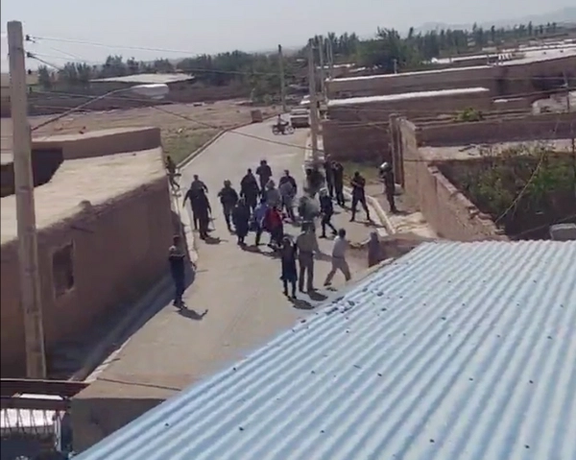
Security forces attacked the family home of a victim of last year’s protests and arrested several family members to stop them from marking his death anniversary.
The incident happened Thursday in Rahmatabad, a village in Qazvin Province when security forces raided the family home of Javad Heydari, 36.
Heydari who was shot dead during a protest in Qazvin on September 22, last year is buried in the village cemetery with “Women, Life, Freedom” inscribed on his grave.
“Can anyone hear my voice? They just attacked our home with bullets and tear gas … So many of them. They beat up the children, they beat up everyone … I don’t know what is happening to my family,” Fatemeh Heydari, Javad’s sister, who was not present at the time of the attack but apparently in contact through the phone, is heard saying between sobs and calling for help.
Security forces attacking the family home of Javad Heydari
“Can anyone in the world hear me? … Do you know what it means to kill your child and then attack your home with bullets on his anniversary? Do you see what they are doing to three, four-year-old children and remain silent?” she goes on to say.
A video of the incident in Heydari’s home village shows riot police outside the gates of the house firing tear gas and attacking people. Shotgun fire and children’s cries are also heard in the video. Another videos shows a teenage girl coughing and having violent convulsions from the tear gas inside the house.
According to Heydari’s sister, security forces arrested several members of the family and relatives including her brother Ruhollah and shut down the internet in the village.
Security forces stopping the family and friends of the 22-year-old Reza Shahparnia in Kermanshah from reaching the cemetery where he is buried.
The Heydari family has been under pressure in various ways since Javad’s death. Fatemeh was fired from her job at Iran’s Mapping Organization in March, and several family members including the parents were arrested in May.
Serious harassment and intimidation have also been reported on social media by several other families in various cities including the family of the 16-year-old Nika Shakarami who was allegedly thrown to her death from a rooftop in Tehran by security agents on September 20 last year.
Social media reports indicate that security forces blocked all roads leading to Nika’s grave at a cemetery in Visian, a village in Lorestan province, to prevent people from reaching the cemetery and holding an anniversary ceremony.
Nika’s mother, Nasrin Shakarami, has announced the cancellation of the ceremony to “prevent harm to participants” and her aunt, Atash Shakarami, was reportedly hospitalized Wednesday with a partial brain stroke caused by the mental pressures and threats she has been enduring.
The brother of 18-year-old Mohammad-Hossein Morovati has said in a video message posted on social media that the family were called in and told by the intelligence ministry that they were not allowed to hold a memorial service and that security agents have removed all banners and posters hung by the family on the walls of their home.
The young man was shot in the heart during last year’s crackdown on protesters in Qarchak in the south of the capital Tehran on September 21.
“The Iranian authorities’ arbitrary arrests, intimidation and harassment of relatives of youngsters, unlawfully gunned down or beaten to death by security forces in connection with protests, exposes their inconceivable cruelty and sinister attempt to cover up their crimes, said Amnesty International today,” Amnesty International said in December.






